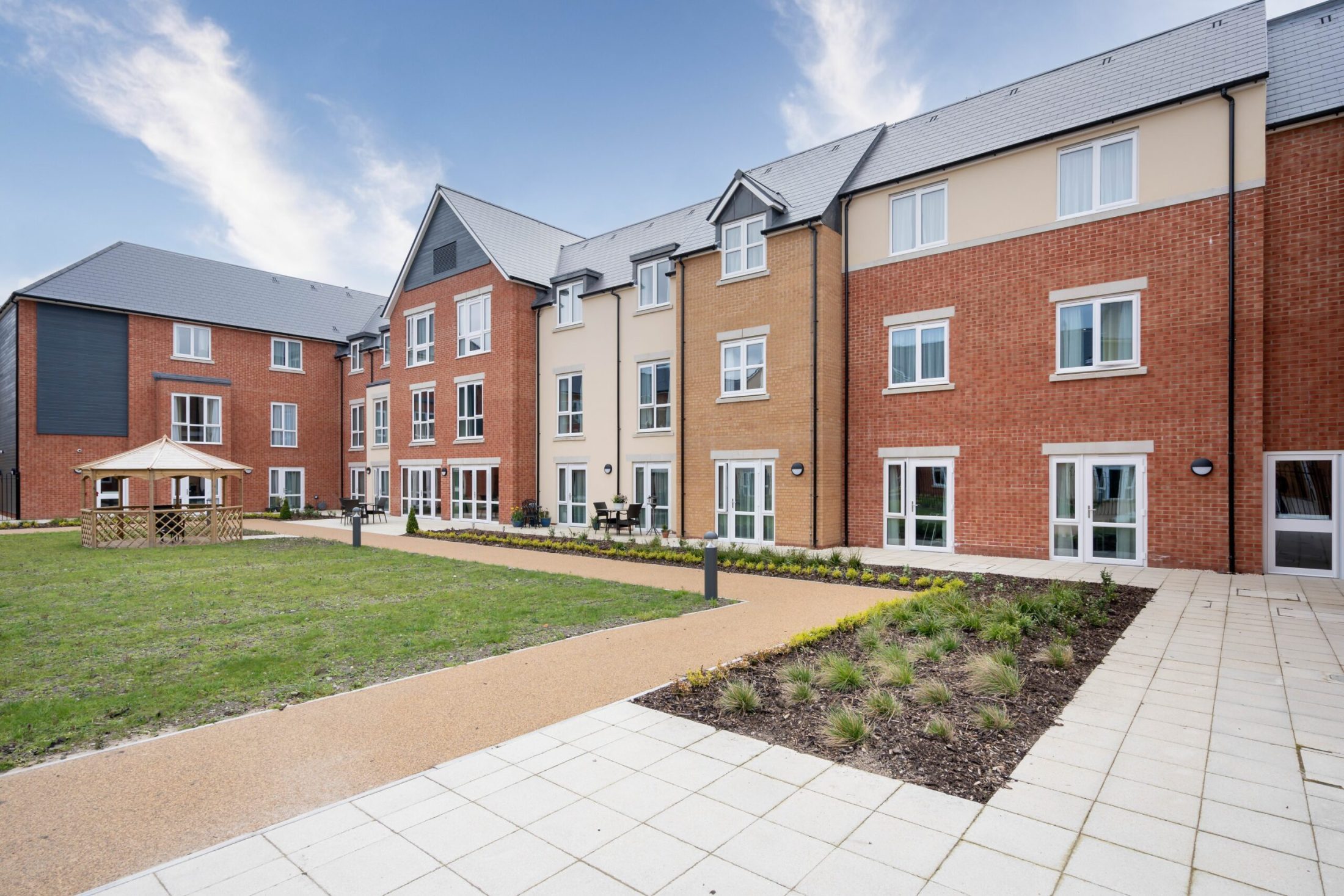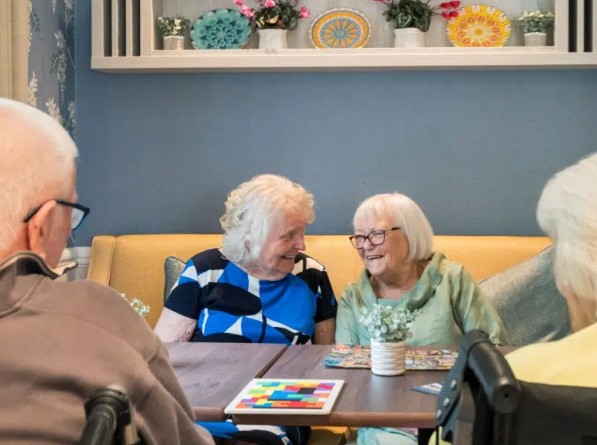
Case Study: Elmbrook Court – Empowering safer, calmer nights with Ally
Overview
Elmbrook Court is a 74-bed care home operated by Oakland Care Group, with two dedicated memory care floors. Supporting residents with dementia and complex needs, the team had long struggled with balancing safety and sleep quality. Traditional bed sensors can trigger frequent false alerts, disrupt residents’ rest and put pressure on staff.
With the trial of 11 Ally AI resident monitoring devices, Elmbrook Court has seen a wide-range of benefits; from reduced falls and infections, to better sleep, improved nutrition, and greater staff confidence.
The challenge
Night-time care was one of the most resource-intensive and disruptive aspects of life at Elmbrook Court. Bed sensors can be highly sensitive and activate from minor movements, waking residents unnecessarily when care staff respond to these. Staff were caught in a cycle of reactive checks.
“When a resident even so much as turns or shuffles around in bed, it can alert the team. So residents can often being interrupted during the night.” cited Rebecca Warman, General Manager
“We were having four, sometimes even five staff on at night-time on the memory care floor.”
The team wanted to trial a smarter solution that could deliver safety without sacrificing dignity or rest.
Trialling Ally: Onboarding & culture shift
The team trialled 11 Ally devices and took a phased approach to onboarding, gradually increasing trust and usage.
“At first we kept the hourly checks in place. Once team confidence in Ally increased, we increased checks to two hourly. Some people eventually go to four hours. And then we became very, very brave and took off the checks entirely for some” said Rebecca.
With targeted training and visible results, Ally became embedded in daily operations.
“It has just become part of their shift. They come in, they log in. It’s as routine as administering medication. Plus, it’s allowed us to focus on people without Ally, knowing those with Ally are monitored well. Falls have reduced.” – Katie Agutter, Unit Manager
Fall reduction & safer nights
Falls on the memory care floor have decreased significantly – by 50% since the implementation of the Ally trial, despite not increasing care staffing levels.
“Once upon a time that was our highest risk area… now falls have reduced,” said Rebecca.
“Across the memory care floor, falls have reduced. We can definitely say that.” – Katie
Residents with Ally monitoring in place were sleeping more restfully and waking less.
“There’s a lady who lives with mental health challenges. She used to be woken up four or five times a night with checks. Now, she only wakes when she needs the bathroom. She’s happier, has fewer low days and better wellbeing.” – Rebecca
In another example, a resident previously found regularly on crash mats was proactively supported before reaching the crash mats.
“We had a lady with crash mats, frequently ending up on the crash mats or the floor. With Ally, the team found her before she even gets to the crash mats. That gives the team a sense of pride when they’re able to manage risks well. It makes them feel good—and when people feel good, they’re more motivated” said Rebecca.
The team also used Ally to investigate incidents. In one case, staff couldn’t understand how a resident had fallen, until they reviewed the audio. “He literally rolled over to move his duvet and went with the duvet onto the floor,” said Katie. “That was something we wouldn’t have known before. But from the motion and sound, you could hear exactly what had happened.”
Early detection of health issues
The team observed better detection of infections and emerging health concerns through monitoring activity patterns.
“We noticed someone was more unsettled. Then, 24 to 48 hours later, they were diagnosed with a UTI. Now we know to look back at sleep and activity patterns as they are early indicators.” shared Rebecca
“We’ve been able to spot straight away when someone is more unsettled,” said Katie. “Especially if it’s someone who’s usually not very active at night.”
Over six months, infections for residents using Ally dropped by more than 50%.
“Infections for those residents have reduced by over 50% in the last six months.” Katie stated. “Because they’re having better night’s sleep, they’re eating and drinking better during the day. That’s reduced infections, especially UTIs,” said Katie.
Nutrition & engagement
Improved sleep has had a direct impact on appetite and engagement. Residents were no longer sleeping through meals or too fatigued to eat.
“They’re more inclined to get up in the morning, engage with the team and have breakfast,” said Rebecca.
“They’re sleeping less in the afternoons and doing more activities. They’re happier with visitors. Their whole day is better,” Rebecca added.
One resident who had been losing weight now has stable weight, and 9 out of the 11 residents using Ally either maintained or gained weight.

Staff empowerment & oversight
The team at Elmbrook Court feel empowered by clearer information and better routines and as a result their confidence has grown as they’ve used Ally.
“There was one team member who didn’t trust it and kept doing unscheduled checks—but with support, that’s reduced, and his confidence has grown,” said Rebecca.
She continued “We have daily emails. Even if I’m not in the building, I can see what’s happened and open conversations with the team. That gives them confidence and a sense of shared responsibility.”
Family reassurance & future expansion
Families have been highly supportive and one relative who’s loved one has Ally in their room was keen to ensure this continued when they changed rooms. Rebecca explained: “Families have been really good from the start. Some asked how invasive it is, but overall, they are curious and onboard.”
Ally has now become part of the home’s narrative when speaking with prospective families. “It’s one of the key things people ask—how are residents cared for overnight?” said Rebecca. “I’ve had more positive conversations recently where I’ve been able to talk about the kind of equipment we’re using here.”
Looking ahead, the team is eager to expand: “We want it in every room. It does what it says on the tin. We know it won’t be right for every single resident, but having the option to implement it when the time is right is so helpful.”
Business Impact & Performance
Since the trial of Ally has been in place, Elmbrook Court has seen:
- 64% reduction in disturbing checks
- 35% reduction in physical checks
- 9 hours of care team time saved per night
- 78 instances of care delivered closer to when it was actually needed
- 5x return on investment in time saved for staff
These operational improvements have enabled staff to work more effectively, focus on preventative care, and support more person-centred routines.
Ally has become a cornerstone of care at Elmbrook Court – transforming night-time safety, enriching daily routines, and enabling early intervention. As Rebecca said:
“We all feel pretty excited. The team has seen the results, and they’re on board. It doesn’t just make us a more attractive care home—it keeps staff engaged and builds trust all round. It means a happier home for everyone.”
“Five years ago, something like this would’ve made people nervous. But now, the team are excited. They’ve seen the results and want more of it.”
Elmbrook Court is a great example of how with the right insight, care homes can achieve safer nights, healthier days, and more confident teams.
Contact Ally today and take the first step to achieving better care outcomes for your residents. Book a demo
